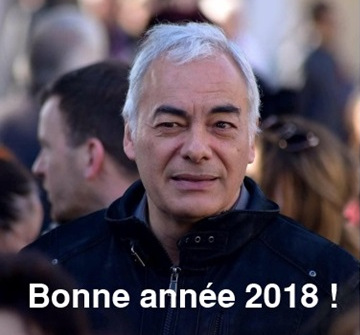In a simple setting and a friendly atmosphere, Patrick Allemand, former Vice-President of the Region, former First Secretary of the Socialist Party, and president of the municipal and metropolitan opposition group “Another Future for Nice”, reconnected with his (quite numerous) supporters for the traditional New Year greetings for 2018.
“It was predicted that after the Socialist defeat in the regional elections in 2016, I would exit politics through the door, and it was hoped that after the electoral result of the presidential in 2017, I would leave politics through the window. Well, I’m still here,” he exclaimed to his faithful supporters.
“I am a left-wing man with a free speech,” is how the president of the association Au Coeur de Nice defines himself, under the watchful eye of Xavier Garcia, his successor at the head of the departmental PS, Nathalie Audin, an unlucky candidate for parliament under the LRM label, and Ladislas Polski (MRC), opposition councilor in La Trinité, who shared regional responsibilities with him during the last mandate.
A quick analysis of the national situation (“the historical right-left divide has shattered, carried away by the winds of Europe and globalization, and the socialists have been the most penalized”) that he could share with Christian Estrosi, who says the same things, before delving into local politics (another favorite theme of the Mayor of Nice). This is the field of action of his association Nice au Coeur, whose dynamism he praised and expressed satisfaction for its development (‘in one year, we have doubled the enrollments’).
Patrick Allemand condemned some negative points of the city’s management, such as the insufficiency of the social housing policy which burdens the most modest households; Christian Estrosi’s attempt to close the Muslim place of worship in the Var plain – “secularism is not the state religion” – asserting the right of individuals to practice their religion; the management of migrant arrival and reception for which – according to him – much more needs to be done; the lack of prospects for extending tram line 1 to the Ariane and La Trinité districts, for which he denounces a “hidden” will to penalize a part of the population from mobility facilities, with the negative effect of creating conditions for communalism.
His hope, a “hope for something else,” as he repeated several times, is that Nice becomes a more open and inclusive city, as its history and traditions remind us.
For this, a unifying spirit that fosters cohesion will be needed: this is his belief and the meaning of his political commitment.
Could Nice au Coeur be the trigger for this? That would be his ambition.


